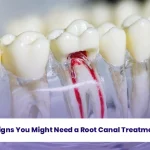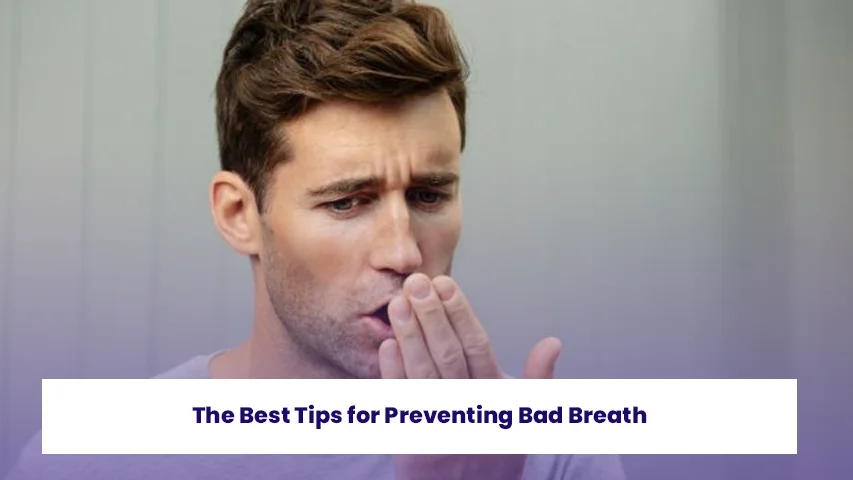
Sinus Lifting vs. Bone Grafting: Which Is Right for You?
22 August 2025
10 Signs You Might Need a Root Canal Treatment
18 September 2025The Best Tips for Preventing Bad Breath

Bad breath, or halitosis, can occur to anyone at any given time. Even though it is not something we would particularly like to talk about, bad breath can actually totally destroy your self confidence and sense of rapport with other individuals. Luckily, there are a number of effective methods of preventing and treating bad breath. Here in this article, we will notice bad breath prevention tips, bad breath causes, and good habits for fresh breath to follow throughout the day.
What Causes Bad Breath?
Prior to discussing solutions, let us have an overview of the causes of bad breath. There are quite a few probable causes for this universal phenomenon:
1. Poor Oral Hygiene
Another very common cause of bad breath is poor oral hygiene. If food particles remain in your mouth, they provide the environment for bacteria to grow on your teeth, gums, and tongue. The bacteria decompose into foul smelling chemicals that produce bad breath. Without brushing and flossing, plaque will also build up and contribute to the smell.
2. Food and Drink
Certain foods and drinks, such as garlic, onion, and coffee, temporarily cause bad smelling breath from the throat. These foods release pungent substances that linger in your mouth and throat for a considerable period after ingestion. The odor of these foods can usually be relieved with good oral hygiene.
3. Dry Mouth
Saliva cleans food debris and bacteria out of your mouth. If you have a dry mouth, through dehydration, medications, or disease, then you have bad breath. Saliva flow is diminished when you sleep, so morning breath is more foul than air at any other time of day.
4. Medical Conditions
Throat or other halitosis, in some cases, can be associated with some medical conditions such as gum disease, sinusitis, respiratory tract infection, or gastrointestinal disorder. Bad breath also can be caused by diseases such as diabetes or liver disease.
5. Smoking and Tobacco Use
Smoking and tobacco also don’t only cause bad breath, but dry out your mouth and reduce your sense of taste. Tobacco also causes your gums to hurt and increase plaque buildup, which makes your breath worse.

Fresh Breath Tips for Daily Care
Having already covered the main causes of bad breath, now is the time to discuss good and helpful fresh breath tips that will freshen your mouth and breath.
Brush Teeth a Minimum of Two Times a Day
The best remedy for halitosis is a regular good oral hygiene practice. Brush teeth a minimum of two times a day using fluoride toothpaste to avoid food particles and plaque, which are the causes of bad breath. Brushing the tongue is also convenient since bacteria love this place to reside. Gently remove bacteria from the tongue with a tongue scraper.
Floss Regularly
Flossing is also crucial in flossing between your teeth and not allowing food particles and plaque to accumulate. This reduces the bacteria in your mouth, resulting in proper prevention of bad breath. Floss every day, and ideally at night.
Stay Hydrated
Drinking plenty of water throughout the day keeps the mouth moist and flushes out bacteria and food particles. Hydration will prevent dry mouth, which will lead to bad breath from the throat.
Use Mouthwash for Bad Breath
Swishing antibacterial mouthwash is an excellent way of keeping your breath fresh and eliminating bacteria. Swish using antibacterial mouthwash that attacks the cause of bad breath, for example, bacteria in your gums and teeth. Make sure the mouthwash you choose isn’t alcohol mouthwash because alcohol dehydrates your mouth and worsens your bad breath.
Chew Sugar Free Gum
Chewing the best gum for bad breath stimulates saliva production, which helps wash away food particles and bacteria. Sugar free gum, especially those containing xylitol, can be a great way to keep your mouth fresh between meals.

Overcoming Bad Breath: Advanced Solutions
If you’ve tried all the common remedies and still find yourself struggling with how to get rid of bad breath, it might be time to consider additional solutions.
Regular trips to the dentist are vital to prevention and recuperation from halitosis. Your dentist will reveal any hidden dental conditions, such as gum disease or tooth decay, which could be contributing to halitosis. Professional cleaning will also remove plaque and tartar accumulation that is responsible for causing bad breath.
If your halitosis has an underlying medical illness like a sinus infection, acid reflux, or diabetes, then ask your doctor to treat the condition. Treating the condition will do a great deal to make your breath smell fresher.
Use a Mouth Spray for Quick Relief
For immediate relief, the worst bad breath mouth spray can be a lifesaver. They will only mask the smell and provide temporary freshness without acting on the underlying causes. Use them together with good oral hygiene to enjoy a fresh mouth throughout the day.
There are some home remedies for bad breath which can be employed:
- Baking soda: Rinse with a solution of baking soda and water that may be useful in destroying odor and bacteria.
- Green tea: Green tea is filled with antioxidants and antibacterial elements that can work to cleanse your breath.
- Apple cider vinegar: Apple cider vinegar and water solution can be useful in destroying pH in the mouth and destroying bacteria.
While not exactly the panacea, these treatments provide relief as well, short term, and can result in better oral hygiene in the long term.

Chronic Bad Breath: Knowing When to Consult a Professional
If you’ve tried various remedies for overcoming bad breath and nothing seems to work, it may be time to consult with a healthcare professional. Chronic bad breath can be a sign of an underlying health issue that requires medical attention. Conditions like gum disease, tooth infections, or gastrointestinal problems can all contribute to persistent bad breath.
Your dentist may also perform a thorough check up in order to find the cause of your bad breath and recommend appropriate treatment. Your doctor may also refer you, if needed, to a specialist such as an ENT specialist or gastroenterologist to manage any of the medical conditions causing your bad breath.
Prevention of halitosis is the key to healthy, smile your way confidence. By simply adhering to these simple tips to beware of, like brushing and flossing teeth every time, antibacterial mouthwash to fight halitosis, hydration with loads of fluids, and elimination of potential reasons for the disease, halitosis is very easily avoided. But if all these efforts continuously with bad breath solution ways fail and continue, advise the medical expert without wasting time for examination of the issue as well as making proper solutions.













